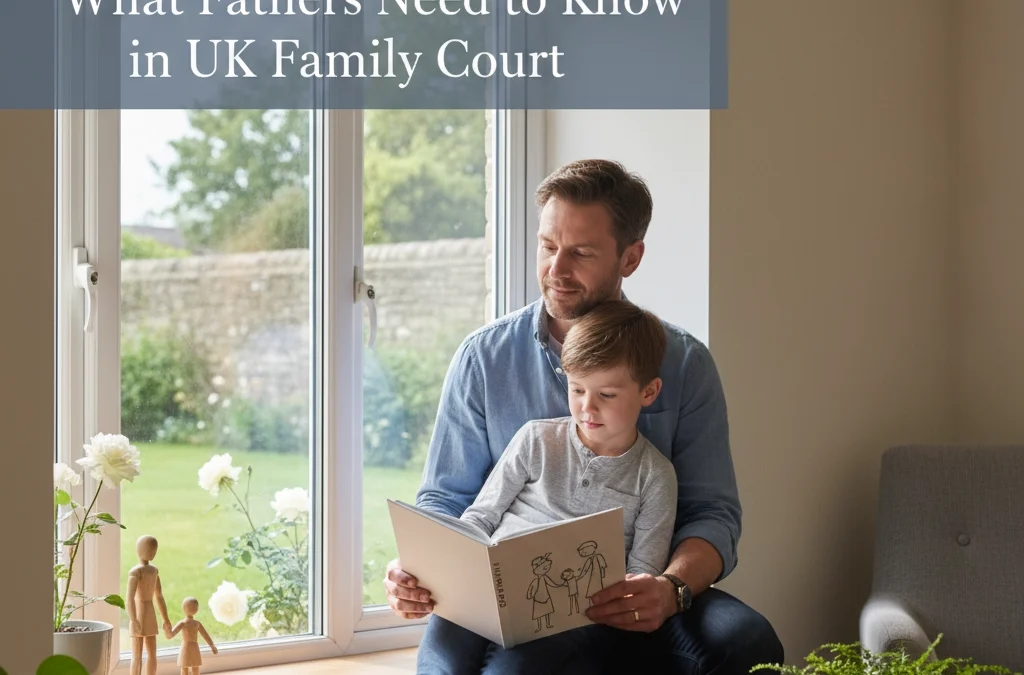When you're fighting for your rights as a father in UK family courts, understanding CAFCASS (Children and Family Court Advisory and Support Service) can make the difference between success and heartbreak. This independent organisation holds significant power in determining your child's future – and yours. Every Dad Matters, and knowing how to navigate this system is crucial for protecting your relationship with your children.
Let's break down everything you need to know about CAFCASS, from their role to how you can present yourself effectively during their assessments.
What Exactly Is CAFCASS?
CAFCASS is an independent non-departmental public body established in 2001 under the Criminal Justice and Court Services Act 2000. Here's what makes them unique – and powerful:
They operate independently from courts, social services, education authorities, and health services. This independence means they're supposed to provide impartial advice, but it also means their decisions carry enormous weight with judges.
Their primary mission is safeguarding and promoting children's welfare while providing advice to family courts. When parents can't agree on child arrangements, CAFCASS steps in as the voice of the child – a role that can either support or challenge your case as a father.

When CAFCASS Gets Involved in Your Case
CAFCASS becomes involved when you or your ex-partner applies to the family court for a Child Arrangements Order. This typically happens when you can't agree on:
- Where your child will live
- Who they'll spend time with
- Decisions about education and healthcare
- Religious upbringing choices
- Holiday arrangements
The harsh reality? Many fathers first encounter CAFCASS during their most vulnerable moments – when they're already fighting for basic access to their children.
Your Rights as a Father in the CAFCASS Process
Before diving into the assessment process, let's be crystal clear about your legal position. Fathers United. Rights Respected. – this isn't just a slogan, it's your legal reality.
Parental Responsibility Matters
If you're married to your child's mother or named on the birth certificate, you have automatic parental responsibility. This cannot be taken away except in exceptional circumstances like adoption.
Key point: Your ex-partner cannot legally prevent contact between you and your child unless there are genuine, significant safeguarding concerns. Some form of contact is almost always considered appropriate by the courts.
The CAFCASS Assessment Process: What to Expect
Stage 1: Initial Safeguarding Checks
The first thing CAFCASS does is conduct preliminary safeguarding checks. They'll contact:
- Local authorities
- Police forces
- Social services
- Other relevant agencies
They're looking for any red flags – domestic violence reports, criminal records, child protection concerns. This isn't personal; it's standard procedure for all parents.
Pro tip: Be upfront about any past issues. Honesty builds credibility, while hidden problems discovered later can destroy your case.
Stage 2: The Section 7 Report
If your case proceeds beyond the initial hearing, the court often requests a Section 7 report – a detailed welfare assessment that can make or break your case.
This comprehensive report examines:
- Your child's physical, emotional, and educational needs
- The likely impact of any changes in living arrangements
- Your child's age, sex, and background
- Any harm suffered or risk of future harm
- Your capability to meet your child's needs

Stage 3: Interviews and Observations
CAFCASS officers will conduct in-depth interviews with:
- You (multiple sessions)
- Your ex-partner
- Your child (depending on age and maturity)
- Other significant people in your child's life
They may also observe you interacting with your child. These observations are crucial – they're looking for genuine, positive relationships and your ability to prioritise your child's needs over conflict with your ex.
How to Present Yourself Effectively to CAFCASS
Show, Don't Just Tell
CAFCASS officers have seen every sob story and every manipulation tactic. What they haven't seen enough of are fathers who consistently demonstrate their commitment through actions.
Practical steps:
- Maintain detailed records of all contact attempts
- Document your child's activities, school events, medical appointments
- Show evidence of your home being child-appropriate
- Demonstrate knowledge of your child's daily routine, friends, and interests
Focus on Your Child's Best Interests
This cannot be overstated: CAFCASS represents your child, not you. Every interaction should demonstrate that you understand this and that your child's welfare comes first.
Avoid these common mistakes:
- Criticising your ex-partner excessively
- Making the sessions about your hurt feelings
- Discussing adult relationship issues
- Showing anger or frustration with the process
Be Prepared for Difficult Questions
CAFCASS officers will probe sensitive areas. They might ask about:
- Past relationship conflicts
- Parenting styles and discipline approaches
- Your understanding of your child's needs
- How you'll handle future disagreements
- Your support network and stability

Understanding CAFCASS Recommendations
Based on their assessment, CAFCASS will make recommendations to the court about arrangements they believe serve your child's best interests. These might include:
- Specific residence arrangements
- Contact schedules and frequency
- Supervised or supported contact requirements
- Conditions for future contact
Important reality check: While courts aren't legally bound to follow CAFCASS recommendations, they rarely go against them. Judges rely heavily on these independent assessments, making your performance during this process absolutely critical.
Special Considerations for Domestic Abuse Allegations
If domestic abuse has been alleged or admitted, CAFCASS must consider additional factors:
- The conduct of both parents toward each other and the child
- The impact of that conduct on everyone involved
- Effects of domestic abuse on the child and proposed living arrangements
- Whether either parent is genuinely motivated by the child's best interests
If you're facing false allegations: Document everything, remain calm and professional, and focus on demonstrating your positive relationship with your child. False allegations are serious, but they're not automatically believed without evidence.
Navigating the First Hearing Dispute Resolution Appointment (FHDRA)
At your first hearing, the court determines CAFCASS's ongoing role. If there are no significant welfare concerns, a CAFCASS officer may help facilitate an agreement with minimal court intervention.
Be strategic: Come prepared with realistic proposals that prioritise your child's stability while protecting your parental rights. Flexibility and reasonableness at this stage can save months of court proceedings.

Working Positively with CAFCASS Officers
Remember, CAFCASS officers are professionals doing a difficult job. They deal with high-conflict situations daily and have seen every manipulation tactic in the book.
Building Credibility
- Arrive on time and prepared for all meetings
- Bring relevant documentation without overwhelming them
- Answer questions directly and honestly
- Show respect for their role and expertise
- Demonstrate consistent commitment to your child's welfare
Maintaining Professional Boundaries
CAFCASS officers aren't your friends, therapists, or advocates. They're investigators whose job is assessing what's best for your child. Maintain appropriate professional boundaries while being personable and genuine.
When Things Go Wrong: Challenging CAFCASS Decisions
Sometimes CAFCASS gets it wrong. Officers are human and can make mistakes, show bias, or miss crucial information.
If you're concerned about their assessment:
- Request specific examples supporting their conclusions
- Provide additional evidence that addresses their concerns
- Consider whether you need legal representation
- Understand the appeals process through your family solicitor
Your Next Steps: Empowering Your Journey
Understanding CAFCASS is just one piece of your fathers' rights journey. The system can feel stacked against you, but knowledge is power, and preparation is everything.
Ready to strengthen your case? Our community at Fathers Rights provides ongoing support, resources, and expert guidance for fathers navigating family courts.
Whether you're just beginning this journey or deep in the system, remember: Every Dad Matters, and your relationship with your child is worth fighting for.
Join us in championing fathers' rights across the UK. Together, we're ensuring that family courts recognise what we know to be true – children need their fathers, and fathers deserve equal treatment under the law.

The road through family courts isn't easy, but with understanding, preparation, and unwavering commitment to your children, you can navigate the CAFCASS process successfully. Stay focused on what matters most – your child's wellbeing and your irreplaceable role as their father.
Fathers United. Rights Respected. Your fight matters, and we're here to support you every step of the way.

